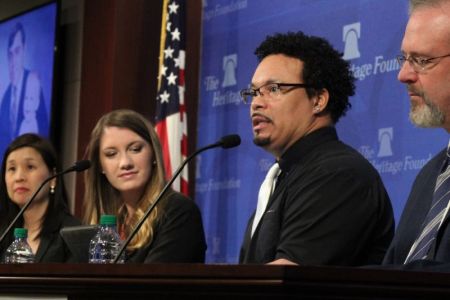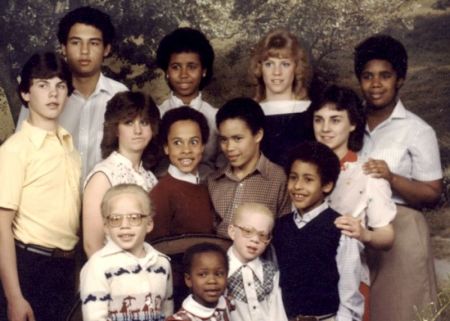Ryan Bomberger Shares How White Parents Defied 'Racist' Decree to Adopt 10 Racially Diverse Babies

WASHINGTON — Pro-life activist and Emmy Award-winning creative professional Ryan Bomberger opened up Monday about the personal sacrifice that his white adoptive mother and father had to make when they decided to bring him into their family as a 6-week-old biracial child conceived in rape.
Bomberger, co-founder of The Radiance Foundation, shared the history of the Bomberger family while speaking during a Heritage Foundation panel discussion on the need to protect faith-based adoption agencies from efforts to banish them in certain states and localities because they do not place children with same-sex couples.
Bomberger's parents, Andrea and Henry Bomberger, have a total 13 children in their family. An astonishing 10 were adopted through faith-based adoption agencies.
"My parents had a heart for adoption. It actually started with my mom who was placed in a children's home [when she] was five years old," Bomberger said. "She had an alcoholic father and her parents were separating. So for a year's time, she lived in a children's home."
It was during her time in the children's home that Andrea Bomberger noticed one little girl with physical disabilities who was never visited by anyone. While Bomberger's mom was visited by her mother and father, this girl seemingly had nobody that wanted to see her.
"It's amazing because we underestimate how much a young child receives and perceives and yet this 5-year-old girl, my mom, was so impacted by the fact that this girl was never visited by anyone," Bomberger said. "She just remembers getting down on her knees and saying, 'God, help me be a mommy to those that don't have one.'"
Andrea Bomberger did just that shortly after Bomberger was born in 1971. But at the time, it was not as socially accepted as it is now to place a black child in the custody of white parents.
In fact, Bomberger said that at the time, the National Association of Black Social Workers even decreed in the early 1970s that "a black child should never be placed in a white home for any reason."
Bomberger is thankful that his parents and the faith-based adoption agency they went through defied that decree. However, Bomberger stated that his mother's decision to adopt him did not come without consequence.
Bomberger explained that his mother tried to have a relationship with her alcoholic father even though he was divorced from her mother. When Andrea Bomberger told her father that she and her husband were going to adopt a biracial baby, things did not go over well.
"She knew that he was a flawed man and he was a very broken man but she didn't realize he was also racist," Bomberger said. "So when she talked about this idea of bringing a black child into their home, her father wanted nothing to do with it. He just said that if you bring that black child into your home, you are basically going to ruin your family."
Bomberger said that his mother's father "didn't want anything to do with the family."
"In fact, he pretty much separated. We never saw him. He missed out on 13 amazing grandchildren," Bomberger said. "So my mother literally had to lose a father in order to gain a son."
Bomberger joked that his adoption must have turned out alright because his parents eventually adopted nine other children. He showed the audience a newspaper clipping from an article about his family from when he was a kid. The article was titled: "'Unwanted Children' Find They're Wanted."
"There is no such thing as unwanted children. Some may find they are unwanted by a biological parent but we are all wanted by someone," Bomberger stressed. "Faith-based agencies understand this. They don't write off a child as unwanted. They know there is someone out there who will love them and that is why they try to place them in amazing homes like this."

There is incredible diversity within the Bomberger family. He shared a photograph of all 13 Bomberger kids.
"We are white, we are black, we are biracial, we are Native American [and] Vietnamese. Two of my brothers are black albinos. Some of us have physical disabilities and some have learning disabilities," Bomberger said of himself and his adopted siblings. "But everyone in this picture — and faith-based agencies understand this — everyone in this picture has special needs. That is to love and be loved. We were all loved like crazy."
Today, the Bomberger family through marriage, birth and adoption has grown to over 63 members.
"This is what it looks like when you defy the world's expectations and when you care for the least of these and when love is at the center of it," Bomberger said.
"Our family wouldn't even be what it is without a faith-based agency," he added. "If it were not through the faith-based agencies that my parents went through, we wouldn't look the way we look."
Over the last several years, a number of faith-based adoption agencies have been forced to halt their adoption services in states like Massachusetts, California, Illinois and Washington, D.C., because they only place children in homes with a mother and a father. Lawsuits filed in Michigan and Texas are trying to get faith-based agencies in those states to violate their religious beliefs by allowing adoption by same-sex couples.
Last month, the city of Philadelphia ceased foster care intake with two faith-based agencies because they won't work with prospective same-sex foster care parents.
The Child Welfare Provider Inclusion Act has been introduced in both the U.S. House and Senate. The legislation would bar federal, state and local governments that receive funding for child welfare services from "taking an adverse action" against a provider that declines to provide a service on the grounds of religious beliefs or moral convictions.





















